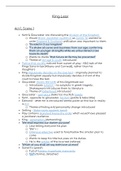Summary
King Lear Summary - CCEA A2 NOTES
- Course
- Institution
- Book
These notes cover every act & scene in King Lear. Notes on each scene contain important quotes with analysis, context on Jacobean England, essay title ideas and any other relevant information. I got an A at A-Level English Literature using these notes!
[Show more]




